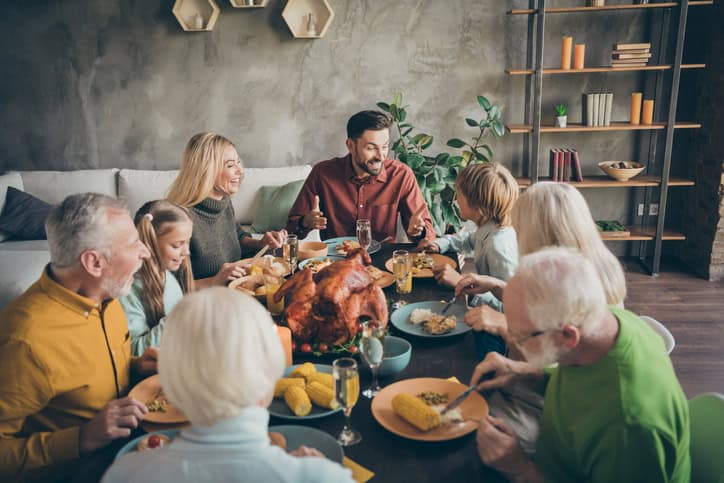
I come from a very large extended family. Growing up Thanksgiving Day always involved lots and lots of family members. There were tables of people here there and everywhere at my Great-Uncle John’s apartment in New York City. Loud and often boisterous conversations filled the air. As a little girl, I was never one to join in. Listening, observing, and melting into the background was where I felt most comfortable. There was an understanding that this was a day of peace and harmony. A day to give thanks. No one dared raise topics which may provoke difficult conversations. When I was a teenager, we moved from the New York City to the Connecticut.
Our Thanksgiving Dinners were different for a few years after we moved to the country (as we called Connecticut). There were the five of us siblings, our new stepbrother, my mother, and stepfather. We, children, missed the big group of cousins, aunts, and uncles, and we were just getting used to our new family. The conversation was sometimes peppered with questions no one wanted to answer or if they answered it was always with a snarky retort. These were difficult conversations.
Years later when I had my own family, we once again filled our home, a friend’s home, or my mother’s home with lots and lots of people. I learned over the years how to moderate conversations so that if a difficult topic is raised it can be gracefully side-stepped. This way conversation does not grind to a halt, and no one feels uncomfortable.
How to avoid difficult conversations at Thanksgiving Dinner
Stay neutral
Remember this meal is meant as a celebration so if someone raises a controversial topic do your best to remain neutral. You can say something like “Thank you for sharing your opinion”. This way you have acknowledged the person’s comment and have avoided difficult conversations by keeping your opinion to yourself.
Have an open mind & avoid difficult conversations
Sometimes people ask questions just to have something to say and they don’t realize they are either asking something too personal or that they are putting you in an awkward position. Keep an open mind and side-step the question. Remember this is a festive occasion and that the person probably didn’t intend to over-step.
Many years ago, at Thanksgiving someone told me that it was time I gave my 2-year-old son a sibling. What they didn’t know was that this was something I was longing to do, and it just hadn’t happened yet. Thankfully my mother over-heard this comment and swooped in with a platter of appetizers. She told this person they simply had to taste these delicious canapes. This gave me a chance to walk away without commenting.
I believe people often say things just to fill the void. They mean no harm. Keep that in mind.
Nod
Body language is also effective. You can nod your head to acknowledge that you are listening. You don’t have to say whether you agree or disagree. If someone asks your opinion, you can deflect and toss the question across the table to someone else saying something like “what do you think about this?”. Or you can change the subject.
Remember why you are at this meal
Thanksgiving is a day to express gratitude for all the blessings you have. I don’t know if you do this but a tradition in my family is to go around the table and ask each person to share one thing for which they are thankful. Even the youngest among us can do that.
If someone begins to walk down the path leading to difficult conversations use one of these tips to guide them away from that topic. Get them talking about the good things in their life. Talk about your children, your dog, sports, or tell a story about something funny that happened to you.
I wish you and yours a very Happy Thanksgiving. My hope is that this feeling of thankfulness and gratitude extends beyond the designated day and permeates all you do this month and going forward into the New Year.
For more tips like this sign up for my monthly newsletter and follow me on Facebook and Instagram.
Diane N. Quintana is a Certified Professional Organizer® ,a Certified Professional Organizer in Chronic Disorganization®, Master Trainer and owner of DNQ Solutions, LLC and co-owner of Release●Repurpose●Reorganize, LLC based in Atlanta, Georgia.


I hope you have a wonderful holiday season with the people you love and do not have too many of these situations to navigate.
Great advice. This is exactly why I love Thanksgiving most of all. It’s my mom, my sister, and myself. We agree on all things politics, and most things other than my bangs. (My mother has serious opinions about my bangs.) I don’t know what would happen if we had in-laws or others at this point in world history. We’d probably need a bouncer! There is no way that any of the three of us could say, “Thank you for sharing your opinion” without our voices and body language implying sarcasm.
These are very practical tips, which is exactly what we need. Few people intend to be difficult at a family gathering, but conversations can spiral quickly when people are offended or hurt. I so agree that often people mean no harm, they just say the wrong thing.
This post reminds us that we have the power to change the direction of the conversation, to “deflate the balloon” for the sake of joy and celebration.
Wishing you a very happy Thanksgiving!
Wow, Diane! First of all, thank you for giving us a glimpse into your history. The images of you celebrating a “boisterous” Thanksgiving in NYC at your uncle’s home sounds amazing…along with getting used to the a new scenario and celebration when you moved to Connecticut.
When I read the title of the post about avoiding difficult conversations, I was intrigued. That’s because it took me a lot of years to learn how to HAVE difficult conversations. I’m not expert, but I’m better at it than I was 20 years ago. However, when I read some of the examples you gave, I realized you weren’t referring to the difficult types of conversations I was thinking about. Your examples are more about when people overstep and say things that are hurtful or inappropriate. A redirection is a good approach. But it’s also OK to say flat out, “I’d don’t want to talk about it,” and then change the subject. We don’t want to make people feel bad, and as a result, take on feeling bad ourselves. Clearing the air and stating how you feel and what you need is AOK to do. OR…as you suggested, reroute.
Wishing you a very Happy Thanksgiving!
One of the many things I’m thankful for is that I have zero recollection of any of those types of conversations at a family dinner. I remember a few uncomfortable moments, but they were the result of a troubled relationship between two family members, and pretty unavoidable if they were going to be together.